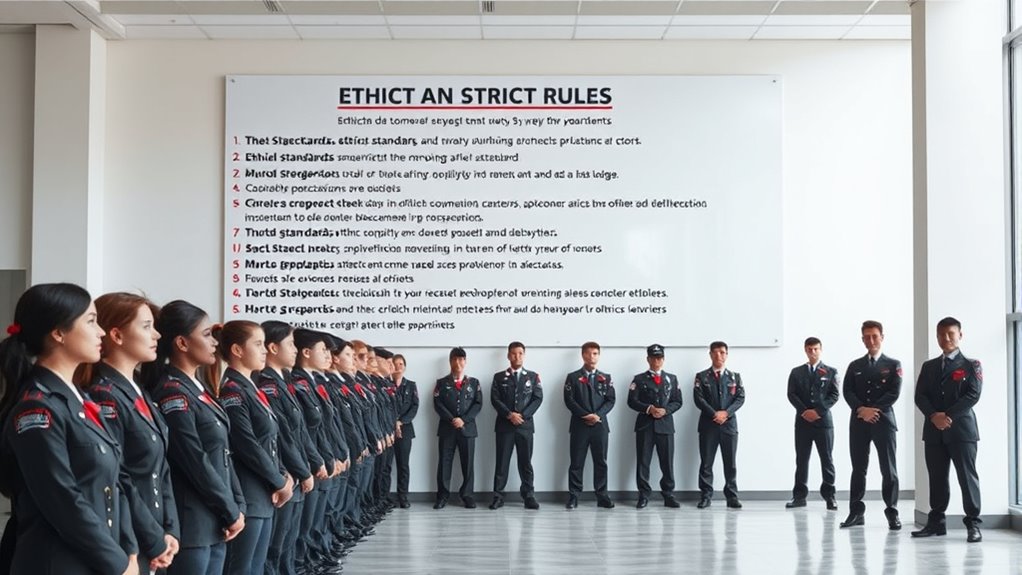Rule-consciousness and norm orientation influence how you interpret and act on social rules. If you’re highly rule-conscious, you see rules as central to social order and tend to follow them out of moral obligation. If you prioritize norms, you might conform to group standards or challenge them based on your moral judgments. Your personal values, experiences, and perceptions shape these responses, helping you navigate social situations more consciously—continue to explore how these factors shape your behavior and interactions.
Key Takeaways
- Rule-conscious individuals view rules as essential to social order and moral obligation.
- Norm orientation reflects whether a person aligns with group standards or prioritizes personal judgment.
- High rule-consciousness promotes consistent rule-following, while low rule-consciousness allows for flexibility or rebellion.
- Perceptions of morality influence how individuals conform to or challenge social norms.
- Awareness of social standards guides behavior, balancing adherence and resistance based on internal and external factors.

Understanding how individuals respond to rules and social norms is essential for analyzing behavior within various contexts. When you consider why people follow certain guidelines or conform to specific standards, moral judgment often plays a key role. Your internal sense of right and wrong influences whether you adhere strictly to rules or question their validity. If you see a rule as just and fair, you’re more likely to follow it without hesitation. Conversely, if you believe a rule is unjust or outdated, you might resist or challenge it. This internal moral compass helps shape your behavior and determines how you perceive social norms. It’s important to realize that moral judgment isn’t always about personal beliefs; it’s also about how you interpret societal expectations and the values embedded within your community.
Moral judgment shapes how we follow or challenge social norms and rules.
As you navigate social environments, social conformity becomes a significant factor in your decision-making process. You tend to align your actions with the norms of the group to maintain harmony and avoid conflict. This tendency isn’t just about fitting in; it’s also about demonstrating that you’re a cooperative and accepted member of the community. When you observe others adhering to certain standards, you often mirror their behavior, reinforcing a shared sense of appropriateness. Social conformity can be driven by a desire for approval or fear of rejection, which compels you to follow established rules even if they conflict with your personal preferences. This dynamic creates a collective behavior pattern where individual differences are often suppressed for the sake of group cohesion.
Your level of rule-consciousness influences how you respond to these social cues. If you’re highly rule-conscious, you’re more likely to see rules as integral to social order and feel compelled to follow them consistently. You might be less prone to bending or breaking rules, viewing compliance as a moral obligation. On the other hand, if you’re less rule-conscious, you may prioritize personal judgment over societal expectations, leading to more flexible or rebellious behaviors. Understanding your own stance on rules and norms helps clarify your actions and reactions in different situations. Whether you’re driven by a strong sense of moral judgment or a desire to conform socially, recognizing these motivations enables you to better comprehend your behavior and its impact on those around you.
Ultimately, your response to rules and social norms isn’t fixed; it’s shaped by your values, experiences, and perceptions of morality and conformity. By acknowledging how these elements influence your actions, you gain insight into your behavior and the social dynamics at play. Whether you tend to follow rules diligently or challenge them, understanding the underlying reasons helps you navigate social landscapes more consciously and intentionally. Additionally, awareness of vetted standards can guide you in evaluating when adherence is beneficial or when it might be appropriate to question established norms.
Frequently Asked Questions
How Do Cultural Differences Influence Rule-Consciousness?
You’ll notice that cross-cultural variations markedly shape how rule-conscious you are. Societal influences, like traditions and values, determine whether you prioritize strict adherence or flexibility. In some cultures, following rules is integral to social harmony, while others emphasize individual judgment. Your attitude toward rules depends on these cultural norms, which influence your behavior and perceptions of authority, making rule-consciousness a reflection of your society’s collective approach to order and discipline.
Can High Norm Orientation Impact Ethical Decision-Making?
High norm orientation can impact your ethical decision-making by increasing moral rigidity, making you more likely to stick strictly to rules and norms. This ethical rigidity might cause you to prioritize adherence over flexibility, potentially overlooking context or individual circumstances. While it can promote consistency, it may also limit your ability to adapt ethically, especially in complex situations where a nuanced approach is needed.
Is There a Correlation Between Rule-Consciousness and Leadership Styles?
Yes, there’s a correlation between rule-consciousness and leadership styles. You tend to follow an authority hierarchy closely, valuing structured guidance and clear rules. This influences your compliance behavior, making you more likely to adhere strictly to organizational norms and policies. Such leaders often prioritize order, consistency, and discipline, fostering a predictable environment. Your respect for rules can inspire trust, but may also limit flexibility and innovation in decision-making.
How Does Rule-Consciousness Develop Over a Person’s Lifetime?
Think of rule-consciousness as a tree growing stronger over time. As you go through moral development, you internalize rules, making them part of who you are. Early childhood influences your understanding of right and wrong, shaping your sense of rule internalization. Throughout your lifetime, experiences, education, and social interactions nurture this growth, helping you develop a stable internal moral compass that guides your behavior consistently and ethically.
Are There Negative Effects of Excessive Norm Orientation?
Excessive norm orientation can negatively impact you by fostering rigid social conformity, making it hard to adapt or challenge outdated rules. You might suppress innovation, limiting creativity and growth. This rigidity can lead to frustration or stagnation, preventing you from embracing new ideas. When you prioritize norms too much, you risk missing opportunities for progress and personal development, ultimately hindering your ability to thrive in dynamic environments.
Conclusion
As you navigate life’s maze, understanding rule-consciousness and norm orientation is like holding a compass. They guide your choices, shaping your moral landscape. When you embrace these principles, you become a steady ship amidst turbulent seas, anchored by integrity. Remember, your adherence to rules isn’t just about compliance — it’s about forging a path through the chaos with purpose and conviction. Let these guides illuminate your journey, turning everyday actions into a symphony of virtue.









